Politics
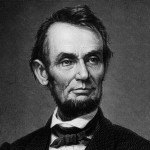 Hot air balloons have been around for a long time, and there have been multiple uses for them. Hot air balloons have been used for everything from travel, recreation, escape, war, and even spying. It was the latter reason that brought President Abraham Lincoln to a field outside Washington DC on October 4, 1861. Those were tumultuous years, with the Civil War in full swing, and both the Confederate and the Union armies were experimenting with the idea of using hot air balloons to gather military intelligence. It was probably a good idea, but there was enough danger involved with this idea, that it proved to be impractical in most situations.
Hot air balloons have been around for a long time, and there have been multiple uses for them. Hot air balloons have been used for everything from travel, recreation, escape, war, and even spying. It was the latter reason that brought President Abraham Lincoln to a field outside Washington DC on October 4, 1861. Those were tumultuous years, with the Civil War in full swing, and both the Confederate and the Union armies were experimenting with the idea of using hot air balloons to gather military intelligence. It was probably a good idea, but there was enough danger involved with this idea, that it proved to be impractical in most situations.
I don’t think most people who were presented with the idea of using hot air balloons in a war situation, were very sold on it. Several firms had been talking to the War Department about balloons, but Thaddeus SC Lowe, who had been working with hydrogen balloons for several 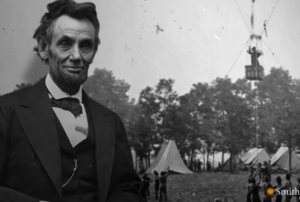 years, and was convinced that they could be a useful tool for collecting intelligence, was the primary figure in that quest. He had conducted trials in April 1861 near Cincinnati, Ohio, with the support of the Smithsonian Institution. On April 19, 1861, he took flight for a trip that would take him to Unionville, South Carolina, where he was immediately jailed by the Confederates, who were convinced that he was a Union spy.
years, and was convinced that they could be a useful tool for collecting intelligence, was the primary figure in that quest. He had conducted trials in April 1861 near Cincinnati, Ohio, with the support of the Smithsonian Institution. On April 19, 1861, he took flight for a trip that would take him to Unionville, South Carolina, where he was immediately jailed by the Confederates, who were convinced that he was a Union spy.
In the end, Lowe had it right. The hot air balloon could be instrumental in winning a war. He became the head of the Union’s Balloon Corpsin 1861 and served effectively during the Peninsular campaign of 1862. With the views provided from his balloon, Lowe discovered that the Confederates had evacuated Yorktown, Virginia, and 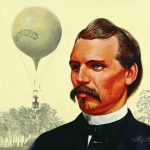 he provided important intelligence during the Battle of Fair Oaks, Virginia. He had a good working relationship with George McClellan, commander of the Army of the Potomac, but had difficulties with McClellan’s successors. Generals Ambrose Burnside and Joseph Hooker were sadly not convinced that balloon observations provided accurate information. I guess they just didn’t have the same vision as Lowe had. Lowe became increasingly frustrated with the army, particularly after his pay was slashed in 1863. Feeling that army commanders did not take his service seriously, Lowe resigned in the spring of 1863. The Balloon Corps was disbanded in August of that year. Lowe later became involved in building a railway in California. He died there in 1913 at age 80.
he provided important intelligence during the Battle of Fair Oaks, Virginia. He had a good working relationship with George McClellan, commander of the Army of the Potomac, but had difficulties with McClellan’s successors. Generals Ambrose Burnside and Joseph Hooker were sadly not convinced that balloon observations provided accurate information. I guess they just didn’t have the same vision as Lowe had. Lowe became increasingly frustrated with the army, particularly after his pay was slashed in 1863. Feeling that army commanders did not take his service seriously, Lowe resigned in the spring of 1863. The Balloon Corps was disbanded in August of that year. Lowe later became involved in building a railway in California. He died there in 1913 at age 80.
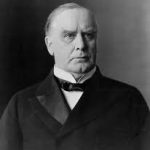 I find it very sad to think that if a person had some ailments or injuries in this day and age, they would likely have lived through the episode, but in days gone by, and for President McKinley, that was not to be the case.
I find it very sad to think that if a person had some ailments or injuries in this day and age, they would likely have lived through the episode, but in days gone by, and for President McKinley, that was not to be the case.
On September 6, 1901, while standing in a receiving line at the Pan-American Exposition in Buffalo, New York, McKinley was approached by Leon Czolgosz, a Polish-American anarchist carrying a concealed .32 revolver in a handkerchief. Czolgosz shot McKinley twice at close range. One bullet deflected off a suit button, but the other entered his stomach, passed through the kidneys, and lodged in his back. When he was operated on, doctors failed to find the bullet. That in and of itself was a very 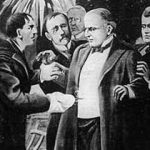 serious situation, but I believe it would have been survivable. Unfortunately for President McKinley, the doctors of that time had few, if any antibiotics to fight infection, and gangrene soon spread throughout the president’s body. McKinley died eight days later, on September 14, 1901. Czolgosz was convicted is of murder and executed soon after the shooting.
serious situation, but I believe it would have been survivable. Unfortunately for President McKinley, the doctors of that time had few, if any antibiotics to fight infection, and gangrene soon spread throughout the president’s body. McKinley died eight days later, on September 14, 1901. Czolgosz was convicted is of murder and executed soon after the shooting.
These days, there have been a number of people who have had injuries far more grave than President McKinley had, and yet they have come through with flying colors. I think it is irrelevant what a person’s politics are or whether you think President McKinley was a good president or a bad president, because this really isn’t about politics at all. The reality is that this man died largely because of a lack of modern medicines that could 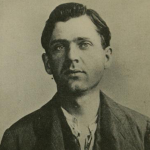 have easily cured the gangrene he had from the shooting, or in most cases, prevented it all together.
have easily cured the gangrene he had from the shooting, or in most cases, prevented it all together.
None of us likes to pay for the cost of some of the life-saving drugs that have been developed, but it is partly that cost that helps to pay for the research that goes into these new medicines. Whether we pay for them by donations before development or cost after development, really makes no difference. I know many people think that the drug companies gouge the patient, and I suppose that could be true to an extent, but which one of us has what it takes to find a medicine that cures some of the diseases we can cure today, that were a death sentence in years gone by?
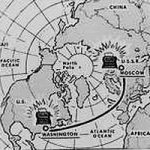 The United States and Russia have long been frenemies, truth be told, but in October of 1962, no one would have called them that. The Cuban Missile Crisis brought the two super powers to the brink of a nuclear conflict. As we all know, that would have been devastating for the inhabitants of the earth, and in the end, both countries agreed that we could not let things escalate to that level again. In June of 1963, American and Russian representatives agreed to establish a “hot line” between Moscow and Washington DC. The idea was to speed communication between the two governments to prevent an accidental war.
The United States and Russia have long been frenemies, truth be told, but in October of 1962, no one would have called them that. The Cuban Missile Crisis brought the two super powers to the brink of a nuclear conflict. As we all know, that would have been devastating for the inhabitants of the earth, and in the end, both countries agreed that we could not let things escalate to that level again. In June of 1963, American and Russian representatives agreed to establish a “hot line” between Moscow and Washington DC. The idea was to speed communication between the two governments to prevent an accidental war.
By August of 1963, the system was ready to be tested. American teletype machines were installed in the Kremlin and at the Pentagon. Many people have thought that the machine at the Pentagon was actually in the White House, but that is incorrect. The two nations exchanged 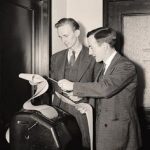 encoding devises so that they could decipher the messages. This would allow the two nations to message each other in a matter of minutes. That would be somewhat slow in today’s high tech world of cell phones and texting, but in those days, it was state of the art. Once received, the message would have to be deciphered, which did slow things down a bit, but again, at that time, it was state of the art. The two teletype machines were connected by a 10,000 mile long cable with “scramblers” along the way to ensure that the messages could not be intercepted by unauthorized personnel.
encoding devises so that they could decipher the messages. This would allow the two nations to message each other in a matter of minutes. That would be somewhat slow in today’s high tech world of cell phones and texting, but in those days, it was state of the art. Once received, the message would have to be deciphered, which did slow things down a bit, but again, at that time, it was state of the art. The two teletype machines were connected by a 10,000 mile long cable with “scramblers” along the way to ensure that the messages could not be intercepted by unauthorized personnel.
On August 30, the United States sent its first message to the Soviet Union over the hot line: “The quick brown fox jumped over the lazy dog’s back 1234567890.” The message was chosen because it used every letter and number key on the teletype machine in order to see that each was in working order. Moscow returned a message in Russian indicating that every key had worked properly. In the end, the hot line was never needed  to prevent war, but instead has become a novelty item, used as a prop in movies about nuclear disaster. Fail Safe and Dr Strangelove were two movies that utilized the machines. The reality was that the two superpowers had come so close to mutual destruction back in 1962, that neither had much stomach for the proposed threat. They understood that communication was key in stopping a nuclear war. Of course, that has not stopped other nations from threatening to use nuclear weapons against other nations of the world. The Cold War ended a long time ago, but the “hot line” is still in operation between the two superpowers, and has since been supplemented by a direct secure telephone connection in 1999.
to prevent war, but instead has become a novelty item, used as a prop in movies about nuclear disaster. Fail Safe and Dr Strangelove were two movies that utilized the machines. The reality was that the two superpowers had come so close to mutual destruction back in 1962, that neither had much stomach for the proposed threat. They understood that communication was key in stopping a nuclear war. Of course, that has not stopped other nations from threatening to use nuclear weapons against other nations of the world. The Cold War ended a long time ago, but the “hot line” is still in operation between the two superpowers, and has since been supplemented by a direct secure telephone connection in 1999.
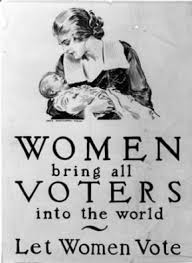 Anytime a group wants to change something in their nation, there is controversy. It really doesn’t matter what the change is, or whether it is good or bad for the country, there will always be people who are against it. The Women’s Suffrage movement, was no different. For more that seventy years, women had been fighting for the right to vote. From the founding of the United States they had not been allowed to vote, and I think originally it was simply because women were viewed as fragile and really to be protected. It didn’t really occur to the men that women could understand politics, wars, and government matters. They were to delicate. That opinion was largely accepted by the women too, until about 1849…73 years after our nation gained its independence from Great Britain. Then some of the women started thinking that they were are smart as the men, and should be allowed to vote too. They were right, of course, but their victory would not come without a long, hard battle. For many years the women who were fighting to vote were look at as
Anytime a group wants to change something in their nation, there is controversy. It really doesn’t matter what the change is, or whether it is good or bad for the country, there will always be people who are against it. The Women’s Suffrage movement, was no different. For more that seventy years, women had been fighting for the right to vote. From the founding of the United States they had not been allowed to vote, and I think originally it was simply because women were viewed as fragile and really to be protected. It didn’t really occur to the men that women could understand politics, wars, and government matters. They were to delicate. That opinion was largely accepted by the women too, until about 1849…73 years after our nation gained its independence from Great Britain. Then some of the women started thinking that they were are smart as the men, and should be allowed to vote too. They were right, of course, but their victory would not come without a long, hard battle. For many years the women who were fighting to vote were look at as 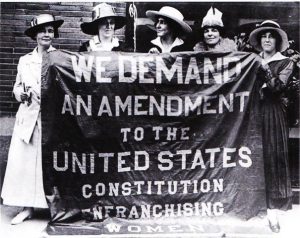 somehow being bold, and well simply not very refined. Proper women were encouraged to avoid them. The men heckled them. Everyone thought of these women as being somewhat trashy.
somehow being bold, and well simply not very refined. Proper women were encouraged to avoid them. The men heckled them. Everyone thought of these women as being somewhat trashy.
I can’t say for sure, just what it was that finally tipped the scales in favor of the women’s right to vote, but quite possibly it had something to do with the “squeaky wheel getting the oil” in the end. Nevertheless, like anything worth fighting for, you continue to fight until you win, or until there is no hope of winning. For the women of the United States, the battle would be won. Changes are sometimes tough to swallow…especially when we think they are 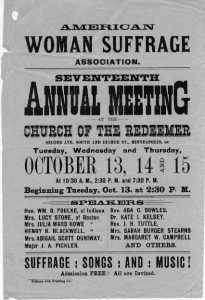 morally wrong. It doesn’t matter what day and age we live in, or what the issue is, someone, somewhere is going to be against the new idea. There will be battles that should be won and those that probably shouldn’t. Nevertheless, like it or not, once a new idea is made law, it usually stays law, unless the law is changed later on. Thankfully, for women everywhere, the right to vote was not repealed, and it will always be our right.
morally wrong. It doesn’t matter what day and age we live in, or what the issue is, someone, somewhere is going to be against the new idea. There will be battles that should be won and those that probably shouldn’t. Nevertheless, like it or not, once a new idea is made law, it usually stays law, unless the law is changed later on. Thankfully, for women everywhere, the right to vote was not repealed, and it will always be our right.
On this day August 26, 1920, the 19th Amendment, guaranteeing women the right to vote, is adopted into the United States Constitution by proclamation of Secretary of State Bainbridge Colby. Women could vote now and forever. People born since 1920, which is most of us, have no concept of the enormity of that amendment. It changed the face of politics, government, and campaigning forever. Not only could women vote, but they could run for office too. And that idea has been up for debate ever since.
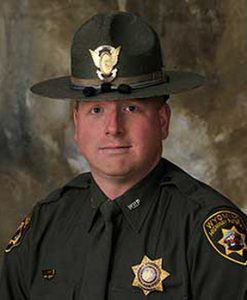 There are people in this world who achieve great things, and then they are so humble about it that they tell almost no one. That seems to be the case with my nephew, Jason Sawdon. Jason, who is married to my niece, Jessi Hadlock Sawdon is a trooper with the Wyoming Highway Patrol. He is part of the accident investigations team, but he patrols as well. Apparently, he is pretty secretive too, or else I was somehow left out of the family loop. On June 24th, 2016, the Wyoming Highway Patrol Association Awards Banquet was held near Dayton, Wyoming. The banquet is to recognize members of the patrol for individual and group achievements and actions in the prior year. The awards at this banquet were for 2015.
There are people in this world who achieve great things, and then they are so humble about it that they tell almost no one. That seems to be the case with my nephew, Jason Sawdon. Jason, who is married to my niece, Jessi Hadlock Sawdon is a trooper with the Wyoming Highway Patrol. He is part of the accident investigations team, but he patrols as well. Apparently, he is pretty secretive too, or else I was somehow left out of the family loop. On June 24th, 2016, the Wyoming Highway Patrol Association Awards Banquet was held near Dayton, Wyoming. The banquet is to recognize members of the patrol for individual and group achievements and actions in the prior year. The awards at this banquet were for 2015.
The WHP District Captains were given the task of reviewing and evaluating the performance of their respective employees and then asked to nominate a Trooper to be considered for the “Trooper of the Year” award. They were asked to look at leadership qualities, the Trooper’s activities, the Trooper’s professionalism during the performance of his or her duties, the Trooper’s reputation within the agency, the public’s perception of the Trooper and how well the Trooper reflects the eight core values of the Wyoming Highway Patrol. My nephew, Jason was nominated for the award, and then declared the winner!!
Now, I was looking for some other information on the Wyoming Highway Patrol website, when Jason’s face suddenly appeared on a scrolling banner. I quickly went back to that page, and was shocked to see that he had been awarded the “Trooper of the Year” award for 2015. I had no idea why we all weren’t told…or if I was just hiding under a rock…but somehow, I didn’t know it. Not telling everyone would be completely typical of Jason, so I guess it was a secret award. Well, Jason, the cat is out of the bag now, because, I am so proud of your accomplishments, that I feel the need to shout it from the rooftops…or at least write about it in my blog.
Jason’s district captain gave him a glowing nomination. I thought you might all like to hear part of what he had to say, so here is an excerpt. “This Trooper views their position as a State Trooper as a position of a true public servant. They maintain a positive outlook, even through difficult situations, and are a credit to the agency. They maintain a strong work ethic and contribute in a wide variety of activities. This Trooper has initiated public speaking and safety events within their division, they set a positive example for their peers, and actively strives to increase highway safety. They actively seek ways to help the division meet goals by voluntarily adjusting their shift in order to provide enforcement during times and areas of concern. Not only is this Trooper productive in terms of quantity, their quality is surpassed by none. They strive to always “do the right thing for the right reason.” They successfully and aggressively enforce state statute while maintaining the respect of the community they strive to protect and serve; as well as the respect of all who know and work with them. They remain actively involved in teaching and participating in academy classes and regularly pushes themselves and their peers toward success. This Trooper demonstrates great courage, humility, and maturity as they fulfill their  obligations. They are a strong example of a Wyoming Highway Patrol Trooper, in their actions, appearance, values, and character. They are a leader amongst their peers and a great asset to the division, the district, and the Patrol.”
obligations. They are a strong example of a Wyoming Highway Patrol Trooper, in their actions, appearance, values, and character. They are a leader amongst their peers and a great asset to the division, the district, and the Patrol.”
I am so proud of the accomplishments of our family’s own Wyoming Highway Patrol “Trooper of the Year” for 2015, Trooper Jason Sawdon. Congratulations Jason!! We are so happy for you. You are an asset to the WHP and to law enforcement in general, and a wonderful asset to this family. Next time…don’t be so modest. You deserve the praise!!
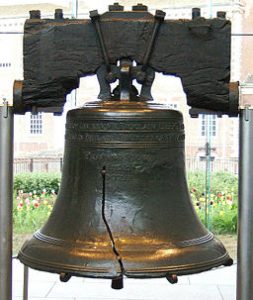 Everyone has heard of the Liberty Bell. The bell was ordered in 1751, to commemorate the 50th anniversary of Pennsylvania’s original constitution. The Pennsylvania Provincial Assembly ordered the 2,000 pound copper and tin bell. The bell was placed in the Pennsylvania State House, which is now known as Independence Hall. The bell rang out summoning citizens to the first public reading of the Declaration of Independence, by Colonel John Nixon. The document was adopted by delegates to the Continental Congress meeting in the State House on July 4th, however, the Liberty Bell, inscribed with the Biblical quotation, “Proclaim Liberty Throughout All the Land unto All the Inhabitants Thereof,” was not rung until the Declaration of Independence was returned from the printer on July 8th.
Everyone has heard of the Liberty Bell. The bell was ordered in 1751, to commemorate the 50th anniversary of Pennsylvania’s original constitution. The Pennsylvania Provincial Assembly ordered the 2,000 pound copper and tin bell. The bell was placed in the Pennsylvania State House, which is now known as Independence Hall. The bell rang out summoning citizens to the first public reading of the Declaration of Independence, by Colonel John Nixon. The document was adopted by delegates to the Continental Congress meeting in the State House on July 4th, however, the Liberty Bell, inscribed with the Biblical quotation, “Proclaim Liberty Throughout All the Land unto All the Inhabitants Thereof,” was not rung until the Declaration of Independence was returned from the printer on July 8th.
The bell was made of inferior materials, and cracked during the first test. It was recast twice and finally hung from the State House steeple in June 1753. The bell was rung on special occasions, such as when King George III ascended to the throne in 1761, and to call the people together to discuss such important things as the controversial Stamp Act of 1765. With the outbreak of the American Revolution in April 1775, the bell was rung to announce the battles of Lexington and Concord. Of course, the most famous time it was rung was July 8, 1776, when it summoned Philadelphia citizens for the first reading of the Declaration of Independence.
When the British were advancing on Philadelphia in the fall of 1777, the bell was removed and hidden in Allentown to protect it from being melted down by the British to be used for cannons. Following the defeat of the British in 1781, the bell was returned to it’s place in Philadelphia which was the nation’s capital from 1790 to 1800. In addition to marking important events, the bell was used as a part of the celebrations such as George Washington’s birthday on February 22, and Independence Day on July 4. In 1839, bell was first given it’s name when it was coined the Liberty Bell in a poem.
As to the crack that finally made the Liberty Bell unsuitable for ringing, there has been some dispute. It was 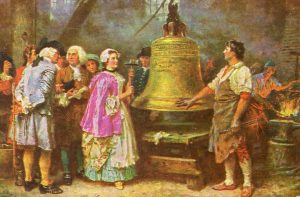 finally agreed upon that the bell suffered a major break while tolling for the funeral of the chief justice of the United States, John Marshall, in 1835, and in 1846 the crack expanded to its present size while in use to mark Washington’s birthday. After that date, it was decided that the bell was unsuitable for ringing, but it was still ceremoniously tapped on occasion to commemorate important events. On June 6, 1944, when Allied forces invaded France, the sound of the bell’s dulled ring was broadcast by radio across the United States. In 1976, the Liberty Bell was moved to a new pavilion about 100 yards from Independence Hall in preparation for America’s bicentennial celebrations. The Liberty Bell will always be a symbol of patriotism and liberty in my mind.
finally agreed upon that the bell suffered a major break while tolling for the funeral of the chief justice of the United States, John Marshall, in 1835, and in 1846 the crack expanded to its present size while in use to mark Washington’s birthday. After that date, it was decided that the bell was unsuitable for ringing, but it was still ceremoniously tapped on occasion to commemorate important events. On June 6, 1944, when Allied forces invaded France, the sound of the bell’s dulled ring was broadcast by radio across the United States. In 1976, the Liberty Bell was moved to a new pavilion about 100 yards from Independence Hall in preparation for America’s bicentennial celebrations. The Liberty Bell will always be a symbol of patriotism and liberty in my mind.
 For me, there is no more perfect way to celebrate Independence Day that to come to the Black Hills of South Dakota. I can’t think of a more patriotic place that is close enough to my home in Wyoming to be able to go to each year. The Black Hills is a shrine to patriotism. Mount Rushmore…home to the faces of four presidents, George Washington, Thomas Jefferson, Theodore Roosevelt, and Abraham Lincoln…brings home that spirit of patriotism that lives inside me. I love going to Mount Rushmore, and every time I go, I feel a sense of awe. These great men did the things necessary to make our country great. We don’t often think about the sacrifice a president made, but George Washington was a great soldier before he was president. He, along with the help of an ancestor of my husband, Bob’s, Henry Knox worked out a strategy to win the Revolutionary War, thereby winning our independence. Thomas Jefferson was the author of the Declaration of Independence. Abraham Lincoln was the
For me, there is no more perfect way to celebrate Independence Day that to come to the Black Hills of South Dakota. I can’t think of a more patriotic place that is close enough to my home in Wyoming to be able to go to each year. The Black Hills is a shrine to patriotism. Mount Rushmore…home to the faces of four presidents, George Washington, Thomas Jefferson, Theodore Roosevelt, and Abraham Lincoln…brings home that spirit of patriotism that lives inside me. I love going to Mount Rushmore, and every time I go, I feel a sense of awe. These great men did the things necessary to make our country great. We don’t often think about the sacrifice a president made, but George Washington was a great soldier before he was president. He, along with the help of an ancestor of my husband, Bob’s, Henry Knox worked out a strategy to win the Revolutionary War, thereby winning our independence. Thomas Jefferson was the author of the Declaration of Independence. Abraham Lincoln was the  man responsible for ending slavery in the United States, and Teddy Roosevelt was chosen because of his contributions to business, conservation and the creation of the Panama Canal. These were four men who saw just how great this nation could be, and who worked to make sure that it always would be a great Constitutional Republic.
man responsible for ending slavery in the United States, and Teddy Roosevelt was chosen because of his contributions to business, conservation and the creation of the Panama Canal. These were four men who saw just how great this nation could be, and who worked to make sure that it always would be a great Constitutional Republic.
For most of us, the Independence Day celebration would not be complete without a grand fireworks display. I have been to a lot of fireworks displays in my lifetime, but few can match the display that takes place every year in Custer, South Dakota. They start by doing the roll call of the states. I have been amazed over the years that almost every state is represented. Then the fireworks begin, with synchronized music, that is the best mix I have ever heard. Of course, every patriotic song in existence is sung, and the display seems to go on for hours. By the time the evening is over, you truly feel like you have celebrated our nation’s birth. I always walk away feeling more patriotic than when I arrived…if that’s possible.

I believe that the United States of America is one of the greatest countries on earth, and in the past few years, people have been trying to tear it down, and make us believe that we are not a great nation with great people. I don’t like that. I don’t like that our government tries to take away our rights, and tries to change the fabric of this nation into a nation of whiney babies that I hardly recognize. I hate to make Independence Day a story about the election, but it’s time to “Make America Great Again.” It’s time to fight for our Constitution, and the freedoms it provides. If we don’t fight for those rights now, they will be gone forever, and with them would go the nation we love. I pray that you all have a very safe and happy Independence Day!!
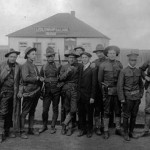 When strikes occur, emotions can get out of control. Sometimes, tensions get so high that they hit the breaking point, and people die. The year was 1914. The date was April 20th. The place was Ludlow, Colorado, and things were about to get out of control. The strike began the previous September, when about 11,000 miners in southern Colorado went on strike against the powerful Colorado Fuel and Iron Corporation. They were protesting low pay, dangerous working conditions, and the company’s autocratic dominance over the workers’ lives. The company was owned by the Rockefeller family and Standard Oil. They responded to the strike by immediately evicting the miners and their families from company-owned housing, which were basically shacks. The United Mine Workers stepped in to help. The miners moved with their families to canvas tent colonies scattered around the nearby hills and the strike continued.
When strikes occur, emotions can get out of control. Sometimes, tensions get so high that they hit the breaking point, and people die. The year was 1914. The date was April 20th. The place was Ludlow, Colorado, and things were about to get out of control. The strike began the previous September, when about 11,000 miners in southern Colorado went on strike against the powerful Colorado Fuel and Iron Corporation. They were protesting low pay, dangerous working conditions, and the company’s autocratic dominance over the workers’ lives. The company was owned by the Rockefeller family and Standard Oil. They responded to the strike by immediately evicting the miners and their families from company-owned housing, which were basically shacks. The United Mine Workers stepped in to help. The miners moved with their families to canvas tent colonies scattered around the nearby hills and the strike continued.
The company had depended on the evictions to end the strike, but when that failed, they hired private detectives to attack the tent colonies with rifles and Gatling guns. The miners fought back and several were killed. The company began to realize that the strikers were determined so Colorado Fuel and Iron Corporation contacted the governor of Colorado, who authorized the use of the National Guard, provided they agree to pay their wages. The strikers mistakenly thought that the governor has sent the National Guard to protect them, but that couldn’t have been further from the truth. The National Guard was under orders to stop the strike…no matter what the cost might be. The National Guard attacked the strikers on April 20, 1914. Two companies of guardsmen attacked the largest tent colony of strikers near the town of Ludlow, home to about 1,000 men, women, and children. The attack began in the morning with a barrage of bullets fired into the tents. The miners shot back with pistols and rifles.
A strike leader was killed while trying to negotiate a truce, and the strikers, fearing that the attacks might intensify. They tried to placed the women and children in pits they had dug beneath the tents. At sunset, the 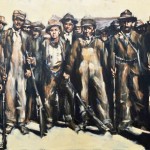 guardsman moved down from the hills and set the tent colony on fire with torches, shooting at the families as they fled into the hills. It wasn’t until the next morning that they discovered the true carnage of their attack. A telephone linesman discovered a pit under one of the tents filled with the burned remains of 11 children and 2 women. The Ludlow Massacre outraged many Americans, nevertheless, the tragedy did little to help the Colorado miners and their families. Federal troops were sent to assure the end of the strike, and the strike failed to achieve any significant improvement in their wages and working conditions. Sixty-six men, women, and children died during the strike, but not a single militiaman or private detective was charged with any crime. Sometimes, the worst injustice comes from the very people who are supposed to protect us.
guardsman moved down from the hills and set the tent colony on fire with torches, shooting at the families as they fled into the hills. It wasn’t until the next morning that they discovered the true carnage of their attack. A telephone linesman discovered a pit under one of the tents filled with the burned remains of 11 children and 2 women. The Ludlow Massacre outraged many Americans, nevertheless, the tragedy did little to help the Colorado miners and their families. Federal troops were sent to assure the end of the strike, and the strike failed to achieve any significant improvement in their wages and working conditions. Sixty-six men, women, and children died during the strike, but not a single militiaman or private detective was charged with any crime. Sometimes, the worst injustice comes from the very people who are supposed to protect us.
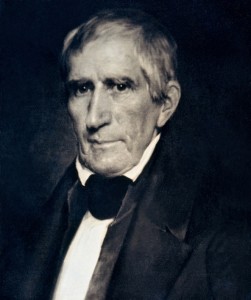 When we think of the president of the United States…in general terms, we often wonder if he will be good enough to be re-elected and serve the maximum term of eight years. We seldom think about whether or not he will finish his first year…or even month for that matter. And few of us can name the president with the sad title of being the president of the United States for the shortest term. Nevertheless, that is a record that has to be held by someone, and that man was William Henry Harrison, who was our 9th President. Harrison’s inaugural speech, delivered on a bitterly cold March morning, lasted one hour and forty five minutes. Harrison wasn’t really feeling well at the time, and went to bed at the end of inauguration day with a bad cold. The cold quickly developed into what would become a fatal case of pneumonia. I have to wonder if he would have been just fine in this day and age of modern medicine. Not everyone gets pneumonia these days, but most of those who do, survive and go on to lead long lives. Pneumonia isn’t the death sentence these days that it used to be.
When we think of the president of the United States…in general terms, we often wonder if he will be good enough to be re-elected and serve the maximum term of eight years. We seldom think about whether or not he will finish his first year…or even month for that matter. And few of us can name the president with the sad title of being the president of the United States for the shortest term. Nevertheless, that is a record that has to be held by someone, and that man was William Henry Harrison, who was our 9th President. Harrison’s inaugural speech, delivered on a bitterly cold March morning, lasted one hour and forty five minutes. Harrison wasn’t really feeling well at the time, and went to bed at the end of inauguration day with a bad cold. The cold quickly developed into what would become a fatal case of pneumonia. I have to wonder if he would have been just fine in this day and age of modern medicine. Not everyone gets pneumonia these days, but most of those who do, survive and go on to lead long lives. Pneumonia isn’t the death sentence these days that it used to be.
William Harrison was the last president born as an English subject before the American Revolution. After that time, it became law that the president must be a natural born citizen, something that has sparked bitter battles in these modern times. He hailed from Virginia, and attended college intending to become a doctor, but opted to join the army before finishing his degree. President John Adams took note of Harrison’s exemplary service in the Indian Wars of the Northwest Territories. In 1801, President Adams appointed him governor of the Northwest Territories, which is now Indiana and Illinois. Harrison later fought in the Battle of the Thames River during the War of 1812. After that time, he decided to go into politics, and went on to become a congressman and the ambassador to Colombia before running with John Tyler on the Whig Party ticket in the presidential election of 1840, which he won, but this would not prove to be a long term in office for him. In fact, his death came exactly one month after he was inaugerated into office.
I have to wonder what things he might have done differently than his running mate, John Tyler did. Harrison was 68 years and 23 days old when he took office. He was the oldest president to take office until Ronald 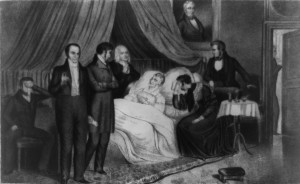 Reagan in 1981. After his passing, there was a brief constitutional crisis, because this had never happened before, and it had to be decided, who would take over. The solution was not widely accepted, and there were disputes as to the presidential line of succession, with regard to the Constitution up until the passage of the 25th Amendment in 1967. William Henry Harrison was the grandfather of Benjamin Harrison, who was the 23rd President from 1889 to 1893, so his line did have a second chance at the course that the country would take, even though he was not directly involved. Of course, there is nothing to indicate that Benjamin would have had the same values as William did. Things change over the years, but he was a Republican…a good thing in my opinion.
Reagan in 1981. After his passing, there was a brief constitutional crisis, because this had never happened before, and it had to be decided, who would take over. The solution was not widely accepted, and there were disputes as to the presidential line of succession, with regard to the Constitution up until the passage of the 25th Amendment in 1967. William Henry Harrison was the grandfather of Benjamin Harrison, who was the 23rd President from 1889 to 1893, so his line did have a second chance at the course that the country would take, even though he was not directly involved. Of course, there is nothing to indicate that Benjamin would have had the same values as William did. Things change over the years, but he was a Republican…a good thing in my opinion.
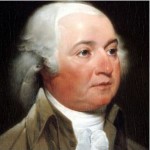 Before women could vote, the first lady in our White House was primarily there to handle the household staff, entertainment, and just look pretty beside her husband…the President. Of course, this was during the age when it was thought that women simply couldn’t handle the serious political information that it took to run a country. These days, women would howl in protest at the thought of being placed in the pretty, but incapable box. In reality, the women back then didn’t like it much either, but it seemed that there was nothing they could do about it…at least, not at the time. Still, even though women were not allowed to vote or have a political voice, there were men who valued the opinions and insights of their wives. One of those men was President John Adams. I suppose that Abigail Adams could have had one of those amazing minds, and that would seem to be the case from the different topics of discussion between John Adams and his wife, but the sequence of events that took place on this day March 7, 1777, is nothing short of amazing.
Before women could vote, the first lady in our White House was primarily there to handle the household staff, entertainment, and just look pretty beside her husband…the President. Of course, this was during the age when it was thought that women simply couldn’t handle the serious political information that it took to run a country. These days, women would howl in protest at the thought of being placed in the pretty, but incapable box. In reality, the women back then didn’t like it much either, but it seemed that there was nothing they could do about it…at least, not at the time. Still, even though women were not allowed to vote or have a political voice, there were men who valued the opinions and insights of their wives. One of those men was President John Adams. I suppose that Abigail Adams could have had one of those amazing minds, and that would seem to be the case from the different topics of discussion between John Adams and his wife, but the sequence of events that took place on this day March 7, 1777, is nothing short of amazing.
While John, who was at the time, a Continental Congressman, was in Philadelphia with the Continental Congress, and Abigail was in Braintree, Massachusetts at the family farm, he wrote her three letters, and received two letters that she had written in February. The correspondence between the two, was quite remarkable, and in all numbered 1,160 letters. They covered topics ranging from politics to military strategy, and from household economy to family health. John could see the value of his wife’s mind in all his life’s work, but probably the most in his presidency…other than family, that is. In many ways, it is sad to think that the minds of so many amazing women have gone untapped when it comes to the political arena. Of course, not all minds, male or female, intelligent or not so intelligent, can be said to have a good grasp of the important things necessary to run a nation, and keep it from derailing…as we have seen in recent years. Our nation needs people who understand how a Constitutional Republic works…and sadly, many don’t. But John Adams knew how important our Constitution was and always would be…as did his wife, Abigail. John was probably on the forefront of modern thought, in that he saw in his wife the ability to think politically, militarily, economically, as well as all of the thoughts any wife and mother has for her family. John and Abigail were not alone either. They were among the few people of that time, who saw women as intellectual and emotional equals.
In his letter, John mentioned that he felt saddened by the move of the capital to Baltimore, saying “This City is a dull Place, in Comparason [sic] of what it was. More than one half the Inhabitants have removed to the Country, as it was their Wisdom to do—the Remainder are chiefly Quakers as dull as Beetles. From these neither good is to be expected nor Evil to be apprehended. They are a kind of neutral Tribe, or the Race of the insipids. By contrast, Adams described the Loyalists, who prepared their Minds and Bodies, Houses and Cellars,  to receive General William Howe should he attack, as a Pack of sordid Scoundrels male and female.” Abigail had written the letters he received on this day, in February, in which she spoke of the difficulty of corresponding during war, but also spoke of the lack of military fervor demonstrated by the New Englanders around her. I’m sure there was a weariness among the people. She wrote that she awaited greater patriotism, greater prosperity and future correspondence from her beloved husband to his devoted Portia, a nickname John had give her likely in reference to the intelligent and devoted heroine of Shakespeare’s Portia in The Merchant of Venice. These words and the respect her husband had for his wife and her mind were very unusual in a time when women were placed in the pretty, but incapable box.
to receive General William Howe should he attack, as a Pack of sordid Scoundrels male and female.” Abigail had written the letters he received on this day, in February, in which she spoke of the difficulty of corresponding during war, but also spoke of the lack of military fervor demonstrated by the New Englanders around her. I’m sure there was a weariness among the people. She wrote that she awaited greater patriotism, greater prosperity and future correspondence from her beloved husband to his devoted Portia, a nickname John had give her likely in reference to the intelligent and devoted heroine of Shakespeare’s Portia in The Merchant of Venice. These words and the respect her husband had for his wife and her mind were very unusual in a time when women were placed in the pretty, but incapable box.

